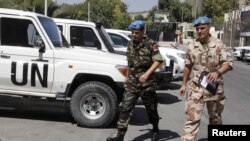CAIRO — Members of the United Nations observer mission wound down their operation in Damascus Monday, packing their bags and leaving Syria for Lebanon. A few observers will remain until week's end. A skeletal crew is due to stay behind and maintain a political liaison office.
With conflict raging in Syria, the United Nations Security Council decided to end the U.N. mission when its mandate expired on Sunday.
The mission, which at its height included 300 international observers, was originally intended to monitor a cease-fire that went into effect last April but failed to take hold.
That cease-fire, part of former U.N.-Arab League envoy Kofi Annan's six-point peace plan, was marred by so much violence that monitors could not effectively do their work safely.
Timor Goksel, a former spokesman of the U.N.'s peacekeeping mission in neighboring Lebanon, said that the observers intended to keep the international community informed of developments on the ground and were not there to broker an end to the conflict.
"If anyone had hoped that they would stop the war, that was wrong," Goksel said. "They were there as the eyes and ears of the international community [which] doesn't really know what is going on there and they still don't know what's going on there. So, now, they're removing that."
Norwegian Gen. Robert Mood, the former commander of the mission, suspended most of the group's activities in June, after violence picked up.
No members of the mission were seriously hurt, although several teams had their vehicles damaged in bomb attacks.
New peace push
Annan resigned recently, saying that he was unable to fulfill his mission. The U.N. has turned to veteran Algerian diplomat Lakhdar Brahimi to take his place.
Goksel, who now teaches at American University of Beirut, says that Brahimi has successfully mediated diplomatic solutions to other thorny conflicts, like the civil war in Lebanon, which ended in 1990.
"When he came to Lebanon we were already at the end of [the] conflict," Goksel said. "People were tired. The time was ripe for a solution. I don't know if the time is ripe in Syria now for a solution, but Lakhdar Brahimi knows the situation quite well. He's not a newcomer in this job. If anyone can handle it, he can.”
Brahimi told a French television station in an interview Monday that the conflict in Syria is a “civil war” and that it must be treated as such.
Syrian opposition leaders criticized Brahimi over the weekend for refusing to call for the departure of Syrian President Bashar al-Assad.
Violence continues
Witnesses say Syrian government forces stepped up their shelling of the rebel-held Damascus suburb of Madhamiya Monday. Opposition activists also reported heavy shelling in and around the cities of Daraa, Deir Ezzor, Homs and Aleppo.
Arab satellite channels showed amateur video of rebel Free Syrian Army fighters in several locales vowing to unite their forces under a larger central command structure.
With conflict raging in Syria, the United Nations Security Council decided to end the U.N. mission when its mandate expired on Sunday.
The mission, which at its height included 300 international observers, was originally intended to monitor a cease-fire that went into effect last April but failed to take hold.
That cease-fire, part of former U.N.-Arab League envoy Kofi Annan's six-point peace plan, was marred by so much violence that monitors could not effectively do their work safely.
Timor Goksel, a former spokesman of the U.N.'s peacekeeping mission in neighboring Lebanon, said that the observers intended to keep the international community informed of developments on the ground and were not there to broker an end to the conflict.
"If anyone had hoped that they would stop the war, that was wrong," Goksel said. "They were there as the eyes and ears of the international community [which] doesn't really know what is going on there and they still don't know what's going on there. So, now, they're removing that."
Norwegian Gen. Robert Mood, the former commander of the mission, suspended most of the group's activities in June, after violence picked up.
No members of the mission were seriously hurt, although several teams had their vehicles damaged in bomb attacks.
New peace push
Annan resigned recently, saying that he was unable to fulfill his mission. The U.N. has turned to veteran Algerian diplomat Lakhdar Brahimi to take his place.
Goksel, who now teaches at American University of Beirut, says that Brahimi has successfully mediated diplomatic solutions to other thorny conflicts, like the civil war in Lebanon, which ended in 1990.
"When he came to Lebanon we were already at the end of [the] conflict," Goksel said. "People were tired. The time was ripe for a solution. I don't know if the time is ripe in Syria now for a solution, but Lakhdar Brahimi knows the situation quite well. He's not a newcomer in this job. If anyone can handle it, he can.”
Brahimi told a French television station in an interview Monday that the conflict in Syria is a “civil war” and that it must be treated as such.
Syrian opposition leaders criticized Brahimi over the weekend for refusing to call for the departure of Syrian President Bashar al-Assad.
Violence continues
Witnesses say Syrian government forces stepped up their shelling of the rebel-held Damascus suburb of Madhamiya Monday. Opposition activists also reported heavy shelling in and around the cities of Daraa, Deir Ezzor, Homs and Aleppo.
Arab satellite channels showed amateur video of rebel Free Syrian Army fighters in several locales vowing to unite their forces under a larger central command structure.




